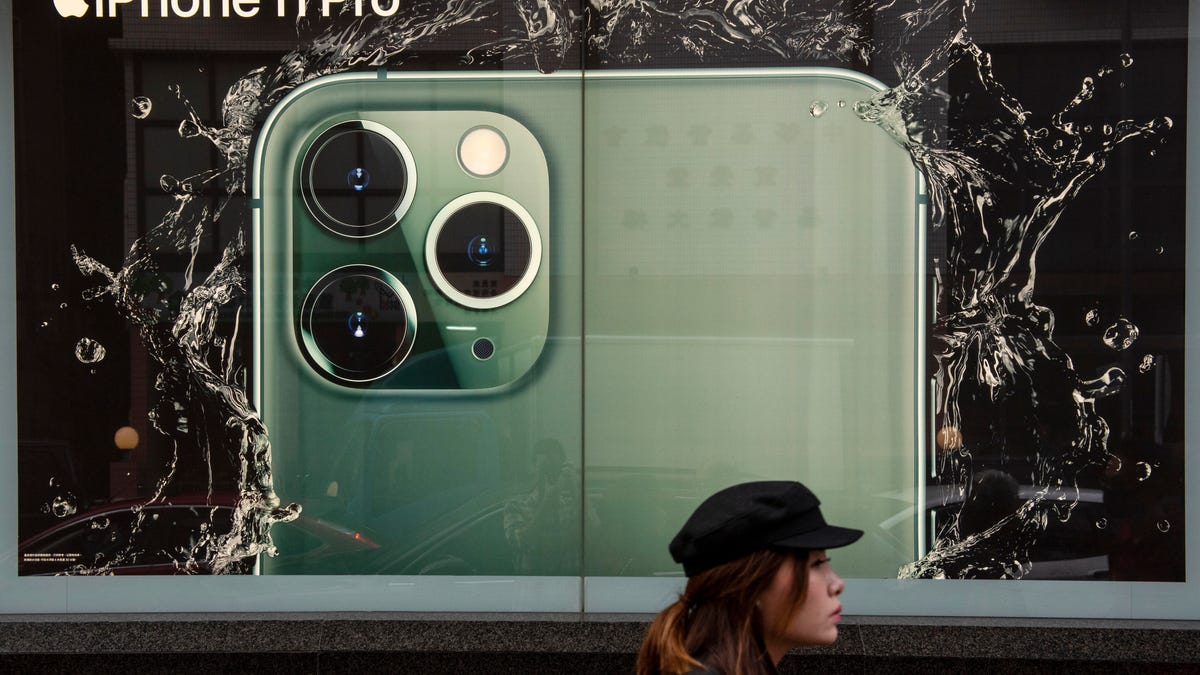Apple could see some impact from coronavirus in China, Cook says
Apple has suppliers in the Wuhan area of China and has taken precautions like closing retail stores.

Apple is taking extra precautions in China because of the coronavirus sweeping the country.
Not even Apple is immune to the coronavirus sweeping the globe, with suppliers and stores impacted by the deadly disease. CEO Tim Cook last week said the company has suppliers in China's Wuhan region, where the coronavirus first emerged. The iPhone maker has alternative sources for those components, he said, and it's "working on mitigation plans to make up any expected production loss."
What's less clear is how the coronavirus will impact suppliers in other parts of China, Cook said. The Chinese government extended the New Year holiday break from the end of January to Feb. 10, which will delay the startup of Apple supplier factories, Cook said.
Even if suppliers do get back to work on Monday, the two week halt of operations could mean delays for some devices. Up to 45 million pairs of AirPods could be caught in limbo while manufactures wait on components needed to assemble the wireless earbuds, according to a report Thursday from Nikkei Asian Review.
Apple made the move to temporarily shutter all of its stores in mainland China and close its corporate offices and contact centers in China through Feb. 9.
"The situation is emerging, and we're still gathering lots of data points and monitoring it very closely," Cook said during a call with analysts after the company reported record earnings on Jan. 28.
Apple factored the possible supplier and retail traffic impact into its revenue guidance for the March quarter, which -- at $63 billion to $67 billion -- is a bigger range than it normally provides. Even with the possible impact, Apple's projection is higher than the $62.45 billion expected by analysts.
The virus' spread
The virus was first detected in the Chinese city of Wuhan late last year. It has claimed more than 560 lives and infected over 28,000 Chinese citizens with a pneumonia-like illness. The virus, known as 2019-nCoV, was reported to the World Health Organization on Dec. 31 and has been under investigation since. Chinese scientists have linked the disease to a family of viruses known as coronaviruses, which include the deadly SARS and Middle East respiratory syndrome.
The virus since has spread to Europe, Australia, the US and other countries. A special WHO committee declared a public health emergency of international concern on Jan. 30, citing "the potential for the virus to spread to countries with weaker health systems."
Apple's China reach
Cook's comments about the coronavirus came as Apple reported all-time record highs for revenue and earnings during the company's fiscal first quarter, which ended Dec. 28. The company benefited from strong sales of its newest iPhones -- 11, 11 Pro and 11 Pro Max -- as well as demand for its AirPods Pro and its services.
China has become one of Apple's most important markets over the past several years. In early 2015, China surpassed the US to become Apple's biggest iPhone market. (The US later regained that status.) Apple's revenue from Greater China rose 3.1% to $13.6 billion in the quarter. It lagged behind the Americas and Europe, but sales in some product areas soared during the period.
Apple saw double-digit growth for its iPhone business in Mainland China in the first quarter, Cook said, a turnaround from sluggishness Apple had experienced in recent quarters. It also had double-digit growth in its services business in China -- which includes its App Store -- and "extremely strong double-digit" growth for its wearables business, which includes the Apple Watch and AirPods, Cook said.
"In terms of the things that customers are responding to, iPhone 11 is doing particularly well there," he said.
While Apple sells a lot of its gadgets in China, it's also tied to the country in another key way. Apple designs its phones in the US, but the devices -- like many other electronics -- are assembled in China. Many of its employees travel frequently between the region and Apple's Cupertino, California, headquarters, and a slowdown in production in China could mean a shortage of iPhones and other Apple devices across the globe.
"We're closely following the development of the coronavirus," Cook said on Jan. 28. "We're donating to groups that are working to contain the outbreak. We are working closely with our Apple team members and partners in the affected areas, and our thoughts are with all of those affected across the region."
CNET's Jackson Ryan contributed to this report.
Originally published Jan. 28.
Updates, Jan. 28: Includes additional comments and background; Feb. 6: Adds more details on impact of coronavirus on Apple.

